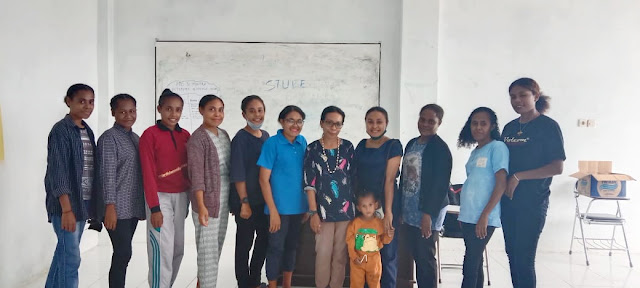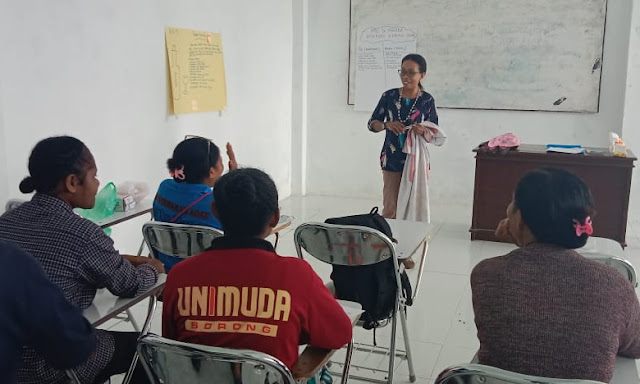The effort to assist young people in the Multiplication of Stube HEMAT in Raja Ampat has resulted in interesting entrepreneurial ideas. Some young people try to think, identify local needs, and determine what they can do with their efforts to be independent through entrepreneurship.
Some of the ideas emerged, and the business covers of making traditional Papua crown crafts, the production of salted fish, flower handicrafts from bath soap, and earrings from shells. This is the idea of Yuliana Mambrasar who comes from Yenanas, South Batanta, Raja Ampat. She chose this business because of her hobby of making traditional crowns, arranging flowers, and carving shells. Even fishing is a daily activity in Yenanas and Teminabuan, South Sorong. She has sold several handicraft products in person and online. She markets the crafts directly to tourist consumers, homestays, and fishery cooperatives in both Sorong and Waisai, the capital of Raja Ampat regency.
Another idea is selling diesel fuel, premium, and kerosene proposed by Alfons Sawoy from Yenanas, South Batanta, Raja Ampat. His idea emerged as an implementation from his study at Management of Nanibili Nusantara University, Sorong. Alfons chooses the business of selling fuel to provide people's needs in the local area, especially farmers and fishermen who use boats to work so that community mobility is availability guaranteed and also family income generating. He designed his start-up business with 600 liters consisting of 200 liters of premium, 200 liters of diesel, and 200 liters of kerosene. He buys fuel in Sorong and then sells it back in his village on Yenanas island.
Business on Papuan traditional bags become Eklefina’s dream. She comes from Aimas, Sorong. She chooses Papuan bags because she had the skill since high school. These bags are souvenirs for tourists who visit Sorong and Raja Ampat. She will run the business by making her yarn bags and selling them directly and leaving them in kiosks or online promotions via Whatsapp and Facebook. To make one bag, she needs one bundle of yarn for Rp 20 thousand, then it can be sold for at least Rp 100 thousand or according to its size. If a bag has a color combination, the price will be different.
The culinary-based business idea was promoted by Esau Sawoy, a theology student at the STFT Izaak Samuel Kijne campus in Jayapura. He is originally from Yenanas, South Batanta, Raja Ampat but currently lives in Jayapura. He chose a catfish-growing business near where he lives in Jayapura because there is an unused pond near his place and he wants to optimize it. In addition, he found the demand in the community for catfish, especially for the food stalls and households.
Another idea is the sale of fuel oil by Adel Mambrasar, a student at Unimuda, Sorong, who comes from Yenanas, South Batanta, Raja Ampat. She chooses the business because almost all the people who live on the island of Doom where she lives have motorized boats. They use boats to cross to the city of Sorong and to the field. So, the fuel sales business is a prospective business opportunity because it answers the needs of the community.
The courage of young people in Raja Ampat to express their entrepreneurial ideas deserves appreciation and support so that they will feel confident to be able to be independent in the future. Give young people a chance and support, and they will prove it. ***

















.jpg)




.png)


.png)
.png)






.jpg)






.jpg)
.jpg)










